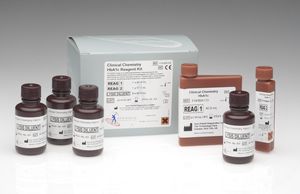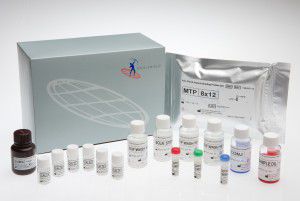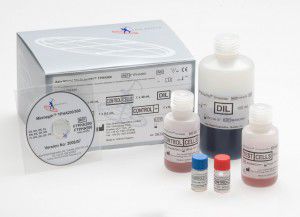
- Laboratory
- Laboratory medicine
- Pharmacology test kit
- Axis-Shield PLC
VB12 test kit FMABT100pharmacologybloodserum
Add to favorites
Compare this product
Characteristics
- Application field
- pharmacology
- Tested parameter
- VB12
- Sample type
- blood, serum
- Analysis mode
- ELISA, automated
Description
Three binding proteins are involved in the transport of vitamin B12 around the body – Intrinsic Factor (IF), transcobalamin (TC) and haptocorrin (HC). These binding proteins ensure the efficient uptake of the very small amounts of vitamin B12 available from the diet. When TC and HC bind vitamin B12 the resulting complexes are known as holotranscobalamin (HoloTC) and holohaptocorrin (HoloHC) to distinguish them from the proteins carrying no vitamin.
The major fraction in the circulation, HoloHC, represents 70-90% of vitamin B12 in the blood but is biologically inert. HoloTC represents only 10-30% of vitamin B12 in the blood but is the only form of vitamin B12 that can be taken up by cells in the body hence it’s alternative name Active-B12. The TC protein alone transports vitamin B12 from its site of absorption in the ileum to tissues and cells. The vitamin is then internalised as the Active-B12 complex via a specific receptor-mediated uptake. This process delivers vitamin B12 into the cells of the body and provides the vitamin as a co-enzyme for essential cellular functions such as DNA synthesis.
The measurement of Total Serum B12 suffers from some limitations; in particular, most of the measured B12 is bound to biologically inert HC. Several studies have been published which conclude that HoloTC would be a better indicator of vitamin B12 status than Total Serum B12.
Easy-to-use ELISA technology, compatible with automated systems for improved throughput.
Reduced false positive and false negative results associated with Total B12 testing
Fewer indeterminate results
No interference from Intrinsic Factor antibodies
Catalogs
No catalogs are available for this product.
See all of Axis-Shield PLC ‘s catalogsRelated Searches
- Assay kit
- Blood assay kit
- Serum assay kit
- Immunoassay assay kit
- Plasma assay kit
- Infectious disease detection kit
- Blood rapid diagnostic test
- Serum rapid diagnostic test
- Plasma rapid diagnostic test
- Clinical assay kit
- ELISA assay kit
- IgG test kit
- Strip detection kit
- Bacteria rapid diagnostic test
- Laboratory detection kit
- Cell assay kit
- Antibody assay kit
- Clinical rapid diagnostic test
- Cardiovascular disease assay kit
- Biochemistry assay kit
*Prices are pre-tax. They exclude delivery charges and customs duties and do not include additional charges for installation or activation options. Prices are indicative only and may vary by country, with changes to the cost of raw materials and exchange rates.









